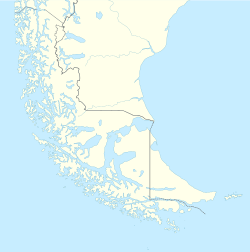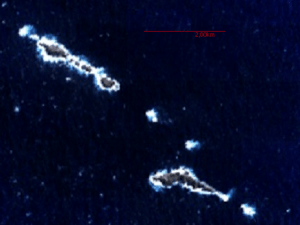Ildefonso Islands facts for kids
The Ildefonso Islands, also known as Islas Ildefonso, are a small group of islands located in Chile. These islands are found in the Pacific Ocean, very far south, close to the southern tip of South America. They are part of the Magallanes Region and are famous for being a vital home for many seabirds.
|
Native name:
Islas Ildefonso
|
|
|---|---|
|
Ildefonso Islands are only 27 km (17 mi) south from Hoste Island
|
|
| Geography | |
| Coordinates | 55°45′S 69°26′W / 55.75°S 69.43°W |
| Adjacent bodies of water | Pacific ocean |
| Total islands | 9 islands and islets |
| Area | 0.2 km2 (0.077 sq mi) |
| Administration | |
| Region | Magallanes |
| Province | Antartica Chilena |
| Commune | Cabo de Hornos |
| Additional information | |
| NGA UFI=-884851 | |
About the Islands
The Ildefonso Islands were named in 1619 by a Spanish explorer named Diego Ramírez de Arellano. He was guiding a trip through this part of the world.
These islands are made up of nine tall, rocky pillars, also called stacks. They are divided into two main groups. The islands stretch out for about 6 kilometers (3.7 miles) in a line from northwest to southeast.
The total land area of the islands is about 200,000 square meters (2,152,782 square feet). More than half of this area is one large southern stack. This stack is about 970 meters (3,182 feet) long and between 80 and 200 meters (262 and 656 feet) wide. The islands are very steep and rocky. They are covered in a type of tough grass called tussac grass.
Home to Many Birds
The Ildefonso Islands are recognized as an Important Bird Area by BirdLife International. This means they are a very important place for birds to live and raise their young.
These islands are home to huge groups of breeding seabirds. For example, there are about 86,000 pairs of southern rockhopper penguins that nest here. There are also around 47,000 pairs of black-browed albatrosses.
Other birds that live on the islands include smaller numbers of grey-headed albatrosses. You can also find Magellanic penguins, imperial shags, and sooty shearwaters here.
See also
 In Spanish: Islas Ildefonso para niños
In Spanish: Islas Ildefonso para niños
- List of islands of Chile
- List of Antarctic and sub-Antarctic islands
- List of Antarctic islands north of 60° S
 | Emma Amos |
 | Edward Mitchell Bannister |
 | Larry D. Alexander |
 | Ernie Barnes |



